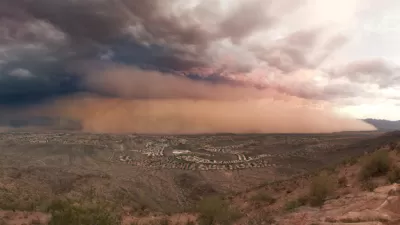Yesterday, the controversial plan to expand New York University's footprint in Greenwich Village over the next 20 years was approved by a City Council committee after last minute negotiations and reductions, reports Joseph Berger.
NYU's controversial 2031 expansion plan came up before the City Council's Land Use Committee on Tuesday, and came away with a 19 to 1 victory, "all but assuring that the city will give the university the go-ahead to proceed with its much-debated development," declares Berger. Under pressure from Margaret Chin, who represents Greenwich Village, NYU agreed to further reductions in building sizes, and promised to preserve more parkland and create more communal spaces, after late night and early morning negotiations. "The changes amount to a 26 percent reduction in space from N.Y.U.'s original plan," notes Berger.
In The New York Observer, Matt Chaban reports on the vocal, if late in the game, opposition to the plan by one key stakeholder group - NYU faculty. According to Chaban, "36 departments or divisions at the university have come out
against the plan," led by Mark Crispin
Miller, a media and culture professor. The group released an alternative plan on the same day as the council vote, arguing, "that NYU only needs a fraction of the space it is
proposing because little of what is being initially built-only 18
percent in the first of four towers-is for academic uses."
While the faculty plan came late in the five-year planning process, the Greenwich Village Society for Historic Preservation, led by executive director Andrew Berman, have raised consistent objections to the plan for the duration of the process.
"In a statement, Mr. Berman called the Land Use Committee's approval 'a
slap in the face to the thousands of area residents and the countless
N.Y.U. faculty and staff workers who called for the plan to be voted
down.'"
"We will take this battle to the full Council," he added, "and possibly beyond."
FULL STORY: N.Y.U. Expansion Plan Wins Key Vote of Council Panel

Alabama: Trump Terminates Settlements for Black Communities Harmed By Raw Sewage
Trump deemed the landmark civil rights agreement “illegal DEI and environmental justice policy.”

Planetizen Federal Action Tracker
A weekly monitor of how Trump’s orders and actions are impacting planners and planning in America.

The 120 Year Old Tiny Home Villages That Sheltered San Francisco’s Earthquake Refugees
More than a century ago, San Francisco mobilized to house thousands of residents displaced by the 1906 earthquake. Could their strategy offer a model for the present?

Ken Jennings Launches Transit Web Series
The Jeopardy champ wants you to ride public transit.

BLM To Rescind Public Lands Rule
The change will downgrade conservation, once again putting federal land at risk for mining and other extractive uses.

Indy Neighborhood Group Builds Temporary Multi-Use Path
Community members, aided in part by funding from the city, repurposed a vehicle lane to create a protected bike and pedestrian path for the summer season.
Urban Design for Planners 1: Software Tools
This six-course series explores essential urban design concepts using open source software and equips planners with the tools they need to participate fully in the urban design process.
Planning for Universal Design
Learn the tools for implementing Universal Design in planning regulations.
Clanton & Associates, Inc.
Jessamine County Fiscal Court
Institute for Housing and Urban Development Studies (IHS)
City of Grandview
Harvard GSD Executive Education
Toledo-Lucas County Plan Commissions
Salt Lake City
NYU Wagner Graduate School of Public Service




























